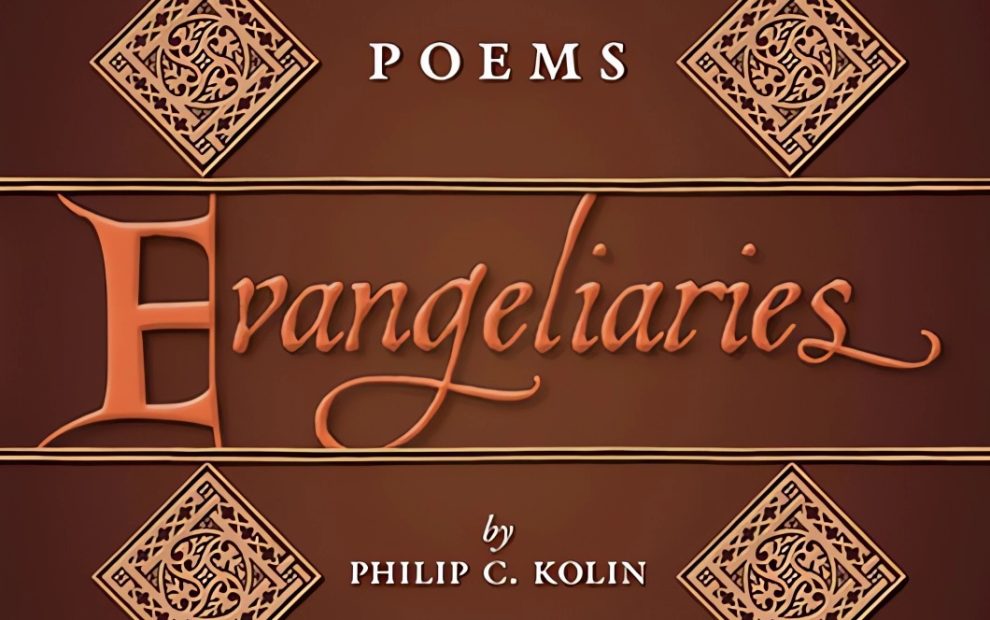Philip Kolin’s new poetry collection, Evangeliaries (Angelico Press) is a tribute to the power of scripture and the Christian tradition to awaken the imaginative faculties. These carefully crafted poems, most of them in verse form, explore Christianity’s dialogic tensions—between suffering and redemption, body and spirit, present and future, the profane and the sacred—and can function as a series of meditations on how holiness shows up in human life.
The collection’s title refers to a type of lectionary containing the excerpts from the gospels that are read in Mass, sometimes with readings from Hebrew scripture and Acts as well. Such books have been around since the early centuries of the church, but during the Middle Ages they were often bound in beautifully illuminated manuscripts, frequently featuring images of the gospel writers.
Kolin’s book is divided into six sections: “Beginnings,” “Holy Books & Theological Virtues,” “Metaphors & Keys,” “Oremus,” and “Life’s Last Country.”Each section connects different aspects of tradition, scripture, or liturgy with others, as well as with personal experience, so that what emerges is an overarching sense of unity, but also an invitation to explore the seeming contradictions of the Christian faith.
In “Beginnings,” Kolin explores different aspects of the creation story. The poem “Blessed Dirt,” is a theological meditation on the Genesis story about God making humanity out of dirt: “God called us from dirt and dirt is what calls us back to Him,” Kolin writes.
But there is also “Gehenna.” Did God make hell, too? The historical Gehenna was, of course, a giant burn pit, the work of human hands, but Kolin’s poem reminds readers of the harsher portions of the gospel: “Christ’s burn pit for sinners’ souls,” he calls it. “Sparrows never fly here; wandering clouds turn to dust.” How to square the loving God who made us out of holy dirt with this vengeful God? This is one of the challenges of Christianity this collection probes.
“Oremus,” the longest section of the book, looks both at traditional prayers, like the Hail Mary and the Angelus, and the unspoken prayers in such human experiences as dread, joy, and justice work. “Deliver us from Fear” illustrated an epigraph from Jesuit Father Gregory Boyle, (“Fear is love’s opposite. . .”) with images of Klansmen knocking on the door of a Black sharecropper and Nazis targeting Jews. “Make Christ your hiding place,” is the poem’s final admonition.
The final section of Evangeliaries is perhaps the most personal, a series of poems about death: a woman dying in hospice, the last words of a COVID-19 patient, Franciscan friars burying the dead. Death’s relentless physicality makes these poems especially sharp.
The closing poem, “We Are Awaited,” depicts death coming like a train to carry the passenger away from earthly life, from “all those whom I wanted to love me, but didn’t.” I am glad that Kolin avoided inserting a facile and optimistic reminder that “Jesus loves me,” since it’s an article of faith we can’t always feel or experience and may frequently doubt. The poem ends with a sort of fading out: “my body becomes soothing light.” We’re allowed to remain with the doubt, and the mystery.
But there is irony, here, too: “We are made of ink and into ink we shall perish,” Kolin writes, reflecting on how much of our lives are taken up with text, written into history.
This irony, which can sometimes jar us out of torpor, is fundamental to the Christian vision, in which we believe that the last will be first, that they who save their lives will lose them, that Jesus is both fully divine and fully human. Or, as Kolin puts it in “Poor in Spirit”:“They feast on fasts and find sustenance in humility.”
Contemporary Christian culture in the United States often glosses over the difficulty of the gospel, preferring simplistic definitions (regardless of whether they accurately reflect reality). Poetry can be an antidote to this, insisting both on the immediacy of lived experience and its defiance of easy dogmatism.
Readers who are Christian will find their faith enriched and complicated—in a good way—by the poems in Evangeliaries, just as the original evangélion, the “good message,” challenged Jesus’ followers. And readers who are not Christian, encountering the poetic scope of the gospel’s tensions, may make the surprising discovery that the Christian tradition is a lot richer and more intellectually demanding than simplistic authoritarianism would have us believe.
Image: Evangeliaries book cover













Add comment